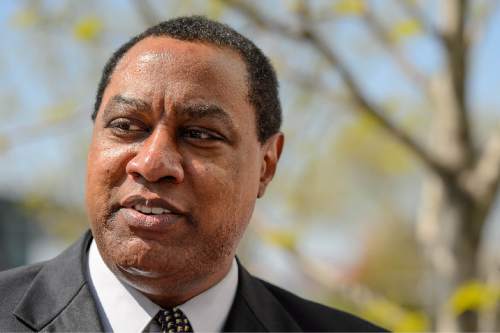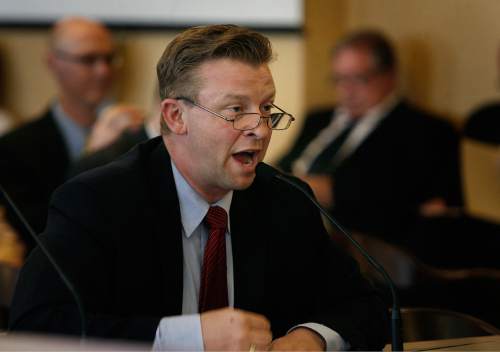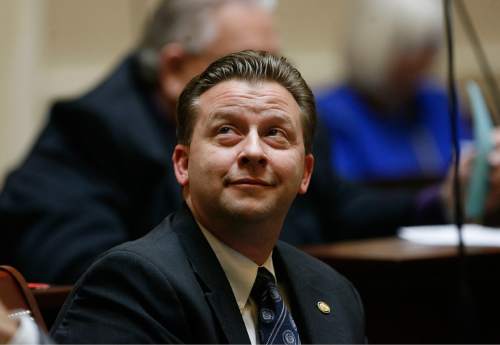This is an archived article that was published on sltrib.com in 2015, and information in the article may be outdated. It is provided only for personal research purposes and may not be reprinted.
A plan to have potential Republican candidates vetted and judged based on their commitment to the party's principles before being eligible for its nomination is drawing fire from some in the GOP who say it empowers a small, elite group of insiders to decide who gets to be a candidate.
Utah Republican Party Chairman James Evans said the idea of creating committees to help screen potential candidates springs from concern that, under the state's new nominating process, people who aren't even Republicans could gather signatures and get onto the primary ballot and the party would be helpless to stop them.
To combat that, Evans said candidates would have to meet with the interview committees to become certified members of the GOP. If they refuse, they would be ineligible to be a candidate for the Republican nomination, he said, because the law says the candidates have to be party members.
Candidates who participated in the interviews would have to pay a party registration fee, which Evans said would be used to publicize the hopefuls' views regarding support of the GOP platform. He has suggested $10,000 per candidate, but said that was merely an off-the-cuff figure and it remains to be seen how much it would cost to become an official candidate.
Sen. Todd Weiler, R-Woods Cross, said Evans' latest idea sets a bad precedent, vesting more power with "a small, select group of elite people who get to decide who runs and who doesn't."
"It's an intimidation method, is what it sounds like," Weiler said. "The party's role has never been to be a gatekeeper. The party's role has always been to be a facilitator, and I think this proposal is somewhat dangerous in trying to redefine that the party stands between candidates and the voters."
Evans said the committee would not be able to reject candidates because they disagree with the party's platform — only if they refuse to be interviewed.
The Republican Party is considering the move in response to SB54, which the Legislature passed last year, giving candidates a way to seek the party's nod without going through its convention system.
Instead, candidates who gather enough signatures could bypass the convention and land a place on the primary ballot.
The law was a compromise with Count My Vote, a group led by former Gov. Mike Leavitt and other prominent Utahns, who insisted the convention system disenfranchised mainstream voters, drove down turnout and produced candidates with fringe views.
The GOP challenged the law in court, saying it deprives the party of the right to make decisions on who the Republican representatives will be. U.S. District Judge David Nuffer denied the party's bid to block enactment of the law, saying he did not see the law infringing on the party's rights — at least not yet.
The lawsuit continues.
Meantime, the party has until September to change its bylaws and declare if it will have candidates on the ballot. In a declaration in the lawsuit, Evans said making the changes by the deadline would be impossible.
If the party fails to be certified, there could be no GOP candidates on the 2016 ballot in one of the nation's most Republican states.
However, Evans now says that, with the vetting process he proposes, the party would retain enough control over the candidate screening that it would ease delegate fears and they would be willing to make the required changes at the August convention so the party can qualify for the ballot.
Weiler said it's "hypocritical" to say that the party couldn't get delegate buy-in before, but now it can, adding the threats of not having Republicans on the ballot was merely a legal ploy.
Rich McKeown, co-chairman of Count My Vote, said it appears the party is trying to "make sure [candidates] have the right blood coursing through their veins" and discourage and intimidate others from running.
"It appears their mindset is to do everything they can to discourage both participation by candidates and participation by the public," McKeown said, "and it contradicts the basic premises and principles of a democracy and or a democratic republic."
McKeown said the mission of Count My Vote has been to let people decide the best candidates on their own and that the party's latest proposal flies in the face of that concept.
Evans said he plans to have members of the party's state Central Committee debate the concept at a meeting May 30 and vote on the proposal at a June 27 gathering. If it is approved, it would be brought to a vote at the Republican state convention in August.
Twitter: @RobertGehrke







